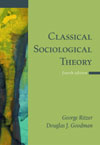
Emile Durkheim |  |
Learning ObjectivesAfter reading this chapter, students should be able to:
- identify the two main themes in Durkheim's sociological theory and discuss how these themes distinguish sociology from philosophy and psychology;
- explain what Durkheim meant by a social fact, particularly the difference between material and immaterial social facts;
- discuss The Division of Labor (differentiate between mechanical and organic solidarity; explain the role of dynamic density in the transition from mechanical to organic solidarity, and the different types of laws that characterize each type of solidarity);
- explain the methodological importance of Durkheim's Suicide (his use of an historical, comparative method to study suicide rates);
- explain the four types of suicide in relation to integration and regulation;
- describe the theoretical importance of religion in The Elementary Forms of Religious Life (distinguish between sacred and profane social phenomena and explain the three other conditions needed for the development of religion);
- explain why Durkheim chose to study primitive cultures in this work, and discuss his sociology of knowledge, including his categories of understanding;
- define what Durkheim meant by the cult of the individual and explain why this concept is important to his theoretical orientation;
- discuss why morality is so central to Durkheim's sociological theory, identify the three components of morality, and explain the role of education in reproducing morality; and
- provide a critique of Durkheim's sociological theory.
|
|